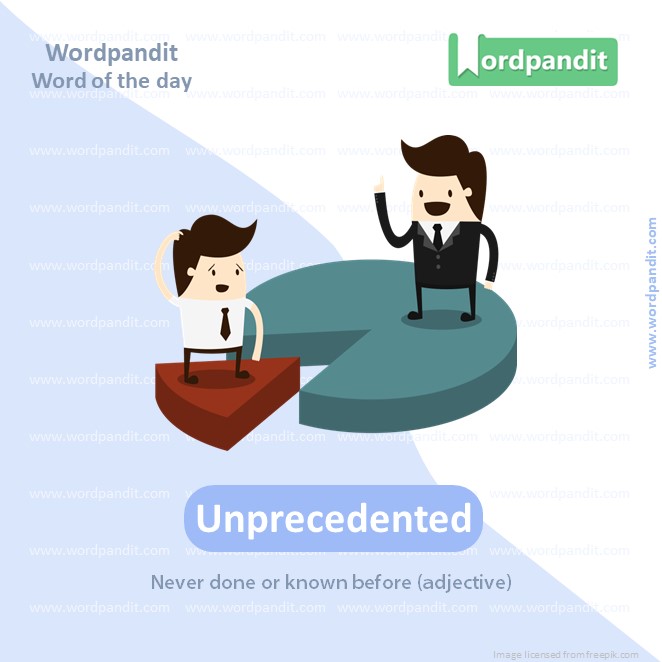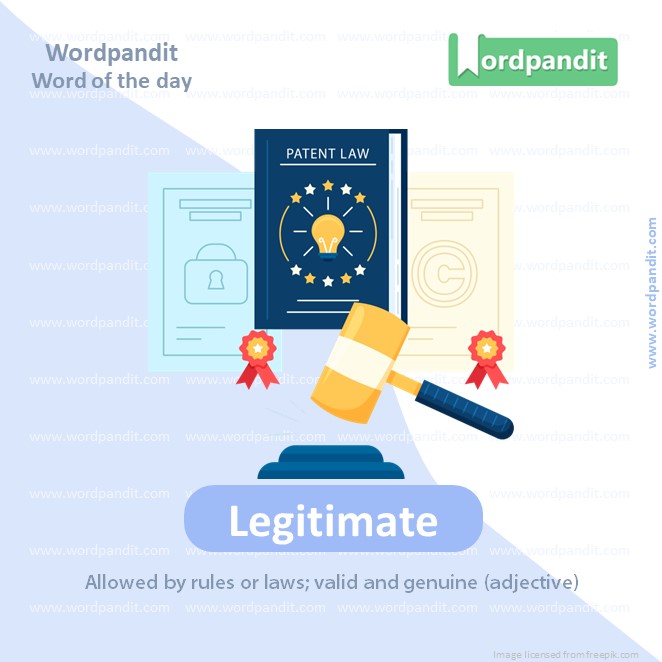Daily Vocabulary Words: List of Daily Used Words in Leading Indian Newspapers
Hi there. Welcome to this special section @ Wordpandit. Our endeavour here is straightforward: highlighting daily vocabulary words that you would come across in leading newspapers in the country. We have included the following newspapers in our selection:
• The Times of India
• The Economic Times
• Hindustan Times
• Mint
• Indian Express
We are putting in extensive work to develop your vocabulary. All you have to do is be regular with this section and check out this post daily. This is your repository of commonly used words; essentially, we are posting a list of daily used words. Hence, this has significant practical application as it teaches you words that are commonly used in leading publications mentioned above.
Visit the website daily to learn words from leading Indian newspapers.

WORD-1: Chastened
CONTEXT: He visualised a world without frontiers, inhabited by chastened and spiritualised people, endowed with noble qualities and sublime attributes.
SOURCE: Times of India
EXPLANATORY PARAGRAPH: Imagine you did something wrong, like spilling your juice, and then you felt sorry and decided to be more careful next time. That feeling of wanting to be better after making a mistake is “chastened”.
MEANING: Made to feel regret or caution following a mistake (verb).
PRONUNCIATION: CHAY-sn’d
SYNONYMS: Humbled, corrected, disciplined, rebuked, subdued, reprimanded, checked.
USAGE EXAMPLES:
1. After his mistake, he felt chastened and promised to be more careful.
2. Her harsh words chastened him, making him rethink his actions.
3. The team’s loss chastened their overconfidence.
4. She chastened herself for not being more prepared.

WORD-2: Auxiliary
CONTEXT: A holistic system of education, in the medium of a national language and an auxiliary international language.
SOURCE: Times of India
EXPLANATORY PARAGRAPH: Think of having an extra toy car when your main one runs out of batteries. That extra toy is like “auxiliary”. It means something that helps or supports when needed.
MEANING: Providing additional help or support (adjective).
PRONUNCIATION: awk-SILL-yuh-ree
SYNONYMS: Supplementary, secondary, backup, reserve, supporting, ancillary, additional.
USAGE EXAMPLES:
1. The hospital has an auxiliary power supply in case of blackouts.
2. She joined the school’s auxiliary dance group.
3. The engine has an auxiliary cooling system.
4. The ship’s auxiliary crew was ready for emergencies.

WORD-3: Unprecedented
CONTEXT: unprecedented in religious history, Baha’u’llah, a prisoner, exiled from his motherland, Iran, advised kings and rulers of the East and West to curb nation-building, to disband their armies.
SOURCE: Times of India
EXPLANATORY PARAGRAPH: Imagine if you saw a purple cow. You’d be amazed because you’ve never seen one before. That’s “unprecedented”. It means something that’s never happened or been seen before.
MEANING: Never done or known before (adjective).
PRONUNCIATION: un-PREH-se-den-tid
SYNONYMS: Unseen, novel, new, unparalleled, unheard-of, unique, revolutionary.
USAGE EXAMPLES:
1. The artist’s success was unprecedented in the music industry.
2. The city experienced an unprecedented heatwave.
3. The technological advancement was unprecedented for its time.
4. She achieved an unprecedented score in the game.

WORD-4: Tabernacle
CONTEXT: Baha’u’llah also urged religious leaders to compose their differences and gather their followers under the tabernacle of unity.
SOURCE: Times of India
EXPLANATORY PARAGRAPH: Think of a special tent or little house where people gather to worship or feel close to God. That special place is called a “tabernacle”.
MEANING: A place of worship or a tent-like structure (noun).
PRONUNCIATION: TAB-er-nah-kul
SYNONYMS: Shrine, sanctuary, chapel, altar, temple, tent, holy place.
USAGE EXAMPLES:
1. The community built a tabernacle for their religious ceremonies.
2. The tabernacle was decorated with beautiful ornaments.
3. During their journey, they set up a tabernacle each night.
4. The priest performed the rituals inside the tabernacle.

WORD-5: Legitimate
CONTEXT: The misgivings are equally legitimate.
SOURCE: Times of India
EXPLANATORY PARAGRAPH: Imagine you have a special ticket to enter a funfair. If the ticket is real and not fake, it’s “legitimate”. It means something is true, fair, or allowed by rules.
MEANING: Allowed by rules or laws; valid and genuine (adjective).
PRONUNCIATION: leh-JIT-i-mate
SYNONYMS: Legal, valid, rightful, genuine, authentic, real, proper.
USAGE EXAMPLES:
1. She had a legitimate reason for being late.
2. The document was found to be legitimate by the authorities.
3. Is this email legitimate or is it a scam?
4. He raised legitimate concerns during the meeting.
WORD-6: Ubiquitous
CONTEXT: the unique digital identity system that is now well-established and is ubiquitous with over one billion residents in India.
SOURCE: Times of India
EXPLANATORY PARAGRAPH: Imagine something is everywhere you go, like seeing the color blue in the sky, the sea, and many toys. That’s “ubiquitous”. It means something is found everywhere.
MEANING: Present, appearing, or found everywhere (adjective).
PRONUNCIATION: yoo-BIK-kwuh-tus
SYNONYMS: Everywhere, omnipresent, universal, pervasive, widespread, prevalent, common.
USAGE EXAMPLES:
1. Cell phones have become ubiquitous in modern society.
2. The ubiquitous smell of fresh bread filled the town.
3. The logo of the brand was ubiquitous in the city.
4. Birds are ubiquitous in nature, found from deserts to forests.
WORD-7: Persuade
CONTEXT: We might persuade them to shed their suspicion of the politics of social justice.
SOURCE: Indian Express
EXPLANATORY PARAGRAPH: Imagine you want a friend to play a game with you, and you talk to them nicely and tell them how fun it’ll be. You’re trying to “persuade” them. It means to convince someone to do something.
MEANING: To convince someone to do or believe something (verb).
PRONUNCIATION: per-SWAYD
SYNONYMS: Convince, coax, influence, sway, encourage, urge, prompt.
USAGE EXAMPLES:
1. She managed to persuade him to come to the party.
2. I tried to persuade my parents to get a pet.
3. The advertisement aims to persuade people to buy the product.
4. It took hours to persuade the child to eat his vegetables.
WORD-8: Disingenuous
CONTEXT: this move so typical of the critics of the politics of social justice — of reducing it to merely a demand for reservation — is disingenuous.
SOURCE: Indian Express
EXPLANATORY PARAGRAPH: Imagine someone tells you they didn’t eat the last cookie, but you see crumbs on their face. They’re being “disingenuous”. It means someone is not being honest or sincere.
MEANING: Not being sincere; pretending to know less than one does (adjective).
PRONUNCIATION: dis-in-JEN-yoo-us
SYNONYMS: Insincere, dishonest, untruthful, deceitful, false, duplicitous, two-faced.
USAGE EXAMPLES:
1. Her excuse for being late seemed disingenuous.
2. It’s disingenuous to pretend you didn’t know the rules.
3. The actor gave a disingenuous smile during the interview.
4. His apology was seen as disingenuous by many.
WORD-9: Majoritarianism
CONTEXT: But perhaps the most terrifying of all spectres is that of caste majoritarianism.
SOURCE: Indian Express
EXPLANATORY PARAGRAPH: Imagine in a class, most kids want to play football and only a few want to play basketball. If the class decides only on football because most kids want it, that’s “majoritarianism”. It means going with what most people want.
MEANING: A philosophy or policy that emphasizes the power of the majority (noun).
PRONUNCIATION: may-jor-i-TARE-ee-an-ism
SYNONYMS: Majority rule, populism, democracy, predominance, popularism, mob rule, commonalty.
USAGE EXAMPLES:
1. The country’s politics seemed to be moving towards majoritarianism.
2. Critics argue that pure majoritarianism can overlook minority rights.
3. Majoritarianism can sometimes lead to decisions that aren’t always best for everyone.
4. The principle of majoritarianism was evident in the recent vote.
WORD-10: Fastidious
CONTEXT: The champions of social justice can, and must, learn from their liberal critics and develop an outlook more fastidious with regard to individual rights.
SOURCE: Indian Express
EXPLANATORY PARAGRAPH: Imagine you have a friend who always wants their toys arranged in a certain way and doesn’t like even a tiny speck of dirt on them. That friend is “fastidious”. It means someone is very careful about small details and wants everything to be perfect.
MEANING: Very attentive to accuracy and detail; hard to please (adjective).
PRONUNCIATION: fas-TID-ee-us
SYNONYMS: Particular, meticulous, finicky, picky, choosy, fussy, demanding.
USAGE EXAMPLES:
1. He is fastidious about his appearance and always dresses impeccably.
2. Her fastidious nature is evident in her perfectly organized room.
3. The chef is fastidious about using only the finest ingredients.
4. Being fastidious can be an asset in professions that require attention to detail.
Vocabulary Pronunciation
The dance of language learning comprises two inseparable partners: vocabulary and pronunciation. The rhythm of this dance is best enjoyed when both partners are in sync. Essentially, mastering ‘vocabulary pronunciation’ is key to expressing and understanding a language effectively. However, what is the ideal approach to learn ‘vocabulary pronunciation’?
Firstly, the process of learning ‘vocabulary pronunciation’ isn’t a sprint. Rather, it’s a marathon where consistency is vital. A gradual and steady pace of learning new words and their pronunciation offers enough time to effectively practice and commit them to memory.
Secondly, to master ‘vocabulary pronunciation’, go beyond written text. Dwell in the world of audible language, such as documentaries, podcasts, music, or language-learning apps that provide pronunciation guides. These memorable auditory experiences aid in refining your ‘vocabulary pronunciation’ and offer a glimpse into the authentic sounds of the language.
Another beneficial strategy for learning ‘vocabulary pronunciation’ involves the use of phonetic transcriptions. They offer systematic approaches to understanding the sound system of a language, thereby improving pronunciation.
Most importantly, do not shy away from practicing your ‘vocabulary pronunciation’. Be it in a language exchange meeting, a conversation with a native speaker, or even a self-recording session, active verbalization massively boosts your pronunciation prowess.
Lastly, always remember to train your ears as much as you train your tongue. Listening carefully to native speakers helps you capture the subtleties of ‘vocabulary pronunciation’, contributing to better delivery when you speak.
In conclusion, mastering ‘vocabulary pronunciation’ is not an overnight journey. It’s a process of intentional practice, sustained listening, conscientious reflection and active usage. As you chart this course with diligence and patience, you will witness your ‘vocabulary pronunciation’ skills blossom, leading you to communicate with greater fluency and confidence.













